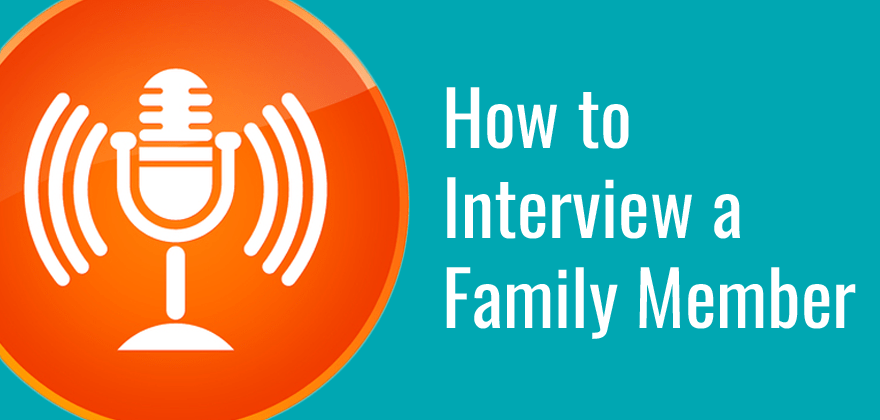Discovering your family history can be a fascinating journey, and the right questions are key to unlocking stories and insights from relatives. This post will guide you through essential interview questions that delve into memories, experiences, and personal histories, providing a deeper understanding of your heritage.
Prepare Thoroughly
Preparation is crucial for getting the most out of a family history interview. Here are some things you need to do before you begin to talk.
Research your family history beforehand. Knowing a little bit about the person you’re talking to is essential. You can’t ask the right background questions if you don’t have some idea of what your interviewee can tell you.
Create a list of open-ended questions. As much as possible, use open-ended questions that require more than a yes or no answer, or a simple name or date.
Organize questions by topic. Have your ancestral charts and family group sheets with you as a reference. The names can be a great way to prompt memories, and the gaps can tell you what questions to be asking.
Your interview might turn up some mistakes, too, that you would never learn about if they weren’t there to catch during the interview.
Sample Interview Questions
You should always tailor your questions to your particular situation. As much as possible, use open-ended questions that require more than a yes or no answer, or a simple name or date.
Here are some possible questions to get you started.
- Were you named after someone? If so, why
- Where and when were you born
- Where did you live when you were growing up? Did you move, and when
- Do you have any siblings? What are their full names and birthdates and places? Are they married, and if so, to whom
- What are/were your parents’ names? Grandparents? What can you tell me about when and where they were born and how they grew up
- Do your parents have any siblings? Your grandparents
- What were your parents’ occupations? Your grandparents
- What memories do you have of your parents? Your grandparents, uncles and aunts, cousins
- What memories do you have from growing up? What is your earliest memory
- What is the most amazing thing that ever happened to you
- What has been your greatest achievement
- Describe the house and city/town where you grew up.Where did you attend school? Did you participate in any sports/activities
- Did you attend college? What was your major
- What hobbies, interests, and pastimes do you have
- What world/national/local events had an impact on you growing up
- Was is/was your (or your spouse’s) occupation? Where do/did you work? When did you retire
- What was your first job? What other jobs have you had? Why did you pick your career
- When and how did you meet your spouse? When and where did you get married? Did you marry more than once
- Tell me about your children
- What church do you belong to? Where and when were you baptized? What religion were your parents?
- Where have you lived as an adult? When did you move?
- Did you serve in the military? When, what branch, what rank, where were you stationed
- What pets have you had? Do you have a favorite story about a pet?
- Do you have any birth, marriage, death, or other certificates, documents, or photos that I could look at, copy, or scan?
- Is there anything else you’d like to tell me that I haven’t asked?
Need more questions? Check out this e-book of 170 questions to ask any family member.
Choose the Right Interviewee
Start with older relatives, especially those with unique knowledge or experiences. Talking to your brother or sister about what it was like growing up isn’t going to help you much. You grew up with them! But if you ask your grandparents the same thing, you can learn a wealth of new information.
Set Up the Interview
Schedule a convenient time and place. Arrange a face-to-face interview if possible. If not, consider phone interviews or Skype. Even a written interview by letter or email is better than nothing.
Explain the purpose of the interview. Make sure your interviewee understands why you want to talk to them and what you hope to learn.
Ask permission to record the conversation. Always ask before making a recording. Some people are nervous or less open when being recorded. If they skip over something while the recorder is on, try asking again at the end after you turn off the recorder.
Gather Your Equipment
Bring a reliable recording device. I recommend using something like a Zoom recording device. A newer model iPhone will also do the trick.
Have a backup method. Take note-taking materials just in case the recording fails.
Consider bringing a camera for photos. Photographs are wonderful for stirring up old memories and stories. Bring a few along that you’d like to know more about, especially if they include people you can’t identify.
Create a Comfortable Atmosphere
Choose a quiet, familiar location. The setting can greatly influence the comfort level of your interviewee.
Start with casual conversation. Ease into the interview with some light, casual conversation.
Offer refreshments if appropriate. This can help make the environment more relaxed.
Ask the Right Questions
Begin with basic biographical information. Use open-ended questions to encourage storytelling and follow up on interesting points.
Listen Actively
- Show genuine interest. Engage with what your interviewee is saying.
- Allow for pauses and reflection. Sometimes the best stories come out after a moment of silence.
- Avoid interrupting. Let your interviewee finish their thoughts before moving on.
Use Visual Aids
- Bring family photos or heirlooms. These can be great conversation starters.
- Use maps for discussing locations. Visual aids can help clarify details.
- Show family trees to clarify relationships. This can help the interviewee understand what you are asking about.
Be Respectful of Sensitive Topics
- Approach difficult subjects carefully. Be mindful of the emotions that certain topics may evoke.
- Respect boundaries and privacy. If your interviewee is uncomfortable, be prepared to change the subject.
Document Accurately
- Take notes even if recording. Having written notes can be very helpful.
- Clarify names, dates, and places. Ensure you have accurate information.
- Ask for spellings of unfamiliar names. This will help prevent errors in your records.
Wrap Up Thoughtfully
- Thank the interviewee for their time. Show your appreciation for their participation.
- Discuss any follow-up plans. Let them know if you plan to reach out again.
- Offer to share the results of your research. This can help maintain a good relationship with your interviewee.
Post-Interview Tasks
- Transcribe the interview promptly. Don’t wait too long to write down the details.
- Organize and label any photos or documents. Keep everything well-organized for future reference.
- Follow up with a thank-you note. A small gesture of appreciation goes a long way.
Related: What to Do With Hundreds of Family Photos
Don’t Wait One of the most important things to remember in conducting family history interviews is don’t wait.
Start as soon as you can.
A few weeks, months, a year from now may be more convenient, but none of us know where we’ll be in a year. If you don’t interview your family members now, you may never get another chance.
Need more questions to ask? Check out my e-book of 170 questions to ask any family member.



I have been enjoying your articles! They have given me so many ideas. It’s helping me organize what I have wanted to say or do for a long time.
Is it ok if I was to print out the list of questions to use? I don’t want to plagiarize your work?
Yes, feel free.
I feel like there aren’t enough questions.
Hey there Green Bean! Thanks for your feedback. This question list is not the be-all-end-all. It’s meant to get you started and give you ideas for other questions to ask.